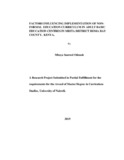| dc.description.abstract | The purpose of the study was to investigate factor influencing implementation of non formal curriculum in Adult Basic Education centres in Mbita District, Homa Bay country. This was facilitated by the research objectives which were qualification of facilitators availability of learning. Teaching materials, relevant curriculum content and the teaching strategies used in the delivery of the curriculum. The study was anchored on education as a fundamental right. The study adopted descriptive survey design. The sample size consisted of 17 centres 6 head teachers, 18 facilitators 3 Divisional Adult Education officers and 255 Adult learners. Data collected through questionnaire and interview schedule. The study captured all the Adult Basic Education centres and the respondents were the facilitators, the Divisional Adult Education officers, and the adult learners. The appropriate questionnaires were administered after random sampling. The purposive random sampling was used to get the relevant Divisional Adult Education officers for the interview. The finding revealed that Adult basic education centres has not attracted qualified facilitators and a quarter are permanently employed. The study acknowledged that professional qualified facilitators were sparsely distributed and are very few. It revealed the government non committal to the non-formal sector of education. The study also found that most of the centres lack learning teaching materials thus affecting the implementation of non formal curriculum. The study reveals that the facilitators lack training and the teaching strategies adopted don’t match the ages of adult learners. The study revealed that vital standard put in place in teaching learning materials, the teacher academic and professional qualification that will match with relevant teaching strategies for effectively and efficient non-formal curriculum implementation. The study revealed that the curriculum should be revised periodically to match the technological advancement and globalization. The study recommendation was the urgent need by the government on clear policy on the sector, training of the adult facilitators and employment on permanent basis to motivate them, decentralization of the sector to the county government and curricular survey as per the social economic of the adult learner. The staffing norms and inspection to be put in place by the quality assurance officials. The study revealed that the Adult Basic Education Sector is largely unexplored area hence the need to do research on the implementation strategies for effective evaluation of the curriculum in both county level and national level. | en |

